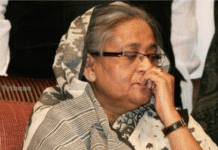
22.03.2018, BTI 2018
Democracy under Pressure: Polarization and Repression Are Increasing Worldwide
Restrictions on free speech, unfair elections and populist hunger for power – it is by no means just autocrats who have been tightening the screw of repression. Governments in democracies have also increasingly been trying to govern with a hard hand. And social division is deeper than it has been for a long time. Our current Transformation Index BTI shows what is behind this development, and which countries have been particularly affected.
From our point of view, a major reason for the poor results is that many governments are not capable or inclined to react to social conflicts by engaging in dialog and seeking a consensus. Governments’ willingness to defuse conflicts has decreased in 58 countries since 2006, according to the index. Once elected, many rulers curtail political liberties and rights in order to expand their political power. This is particularly the case with authoritarian populists like those in Hungary or Turkey, even though they have come to power via grassroots movements and polarization themselves. Our chairman and CEO Aart De Geus comments on the research findings:
“Many rulers try to cement their claim to leadership through repressive measures. However, in the long run, ruling by coercion and not by dialog always leads to a dead end.”
Aart De Geus, chairman and CEO of the Bertelsmann Stiftung
More inequality, less freedom
The authors view unsatisfactory socio-economic development to be one of the greatest impediments to development towards democracy and economic sustainability. According to the study, there is massive poverty and a high level of social inequality in 72 developing and transformation countries. In 22 of them, including India, South Africa and Venezuela, there has even been a decline in the level of socio-economic development in the last ten years. During the same time period, the proportion of countries achieving a moderate to good level of social inclusion sank from a third to a quarter.
More and more people are living not only in less equal, but also in more repressive environments. At the present time, 3.3 billion people are governed autocratically (4.2 billion democratically), which is the highest number since the study began. Of the 129 countries studied, the BTI classifies 58 as autocracies (2016: 55) and 71 as democracies (2016: 74). But it is not so much the slight increase in the number of autocracies that is worrying. More problematic is the fact that civil rights are being curtailed and the rule of law undermined in an increasing number of democracies as well. Former beacons of democratization such as Brazil, Poland and Turkey are among the countries that have fallen the most in the Transformation Index.
Only Burkina Faso and Sri Lanka were making significant progress towards democracy during the period under review. By contrast, there are a total of 13 countries, including Mozambique, Turkey and Yemen, where the political situation has become significantly worse. Five of these 13 countries no longer meet minimum standards for democracy: Bangladesh, Lebanon, Mozambique, Nicaragua and Uganda, where democracy has been gradually undermined for years, are under autocratic rule. It was often shortcomings in the quality of elections that tipped the balance.
Democracies govern better than autocracies
These developments are worrying for citizens because corruption, social exclusion and barriers to fair economic competition continue to be more prevalent in autocracies. According to the BTI, while 12 democracies have combated corruption successfully, only one autocracy did so. Only two autocracies, but eleven democracies have achieved sufficient equal opportunity. 27 democracies, but only two autocracies exhibit well-functioning market and competitive systems. “The BTI clearly shows that anti-democratic systems are by no means more stable and efficient than democratic ones,” says Aart De Geus.
It is true that China, whose share of the global economy has increased the most in the last ten years, is considered by many to be a prime example of prosperity in a state of absence of freedom. However, those who attribute China’s economic success solely to its political system fail to recognize the predominantly poor economic results of autocracies as a whole – and the dangers of a cult of personality. This can be seen clearly by looking at other autocratic systems such as Russia, Thailand and Venezuela. Here, according to the BTI experts, both economic as well as democratic development have been stagnating for years.

 The main results of BTI 2018 at a glance. You can download this infographic in higher resolution on the right (if you are on a mobile device: below).
The main results of BTI 2018 at a glance. You can download this infographic in higher resolution on the right (if you are on a mobile device: below).







